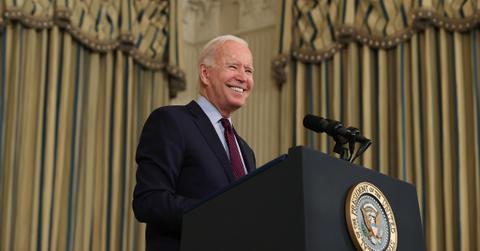Is There a Mileage Tax in Biden's $1.2 Trillion Infrastructure Bill?
Some people on social media platforms are claiming that mileage tax is included in Biden’s $1.2 trillion infrastructure bill. Are they right?
Oct. 5 2021, Published 8:24 a.m. ET

Some people on social media platforms are claiming that mileage tax is included in President Biden’s $1.2 trillion infrastructure bill. There have been claims that Biden’s new driving tax is anticipated to cost about 10 cents per mile. Are the claims right about a mileage tax becoming a reality soon?
It might sound small, but at 10 cent rate, that would amount to $1,000 in new annual taxes for the average American who drives around 10,000 miles a year.

What is a vehicle mileage tax?
A vehicle mileage tax would charge drivers a fee depending on the number of miles they drove. The time duration might vary, but usually a vehicle mileage tax is measured over a one-year period. The government can use the mileage tax collected to fund transportation and infrastructure initiatives.
Mileage tax claims are false
Biden’s infrastructure plan doesn’t impose a new mileage tax on drivers. Instead, the bill proposes a “national motor vehicle per-mile user fee” pilot project to examine the impacts of a mileage tax. If the bill is approved, pilot participants will be required to keep track of how many miles they travel and pay fees depending on those miles.
Enrollment would be optional and participants would be reimbursed for the fees they paid. Participants would continue to pay the traditional gasoline tax, but would also start paying a per-mile user charge set by the Treasury Department. If the bill is passed as is, up to $125 million would be spent on the five-year pilot project, which will run through the summer of 2026.

Why study a mileage tax?
One of the goals of the pilot initiative is to look into different revenue streams for funding surface transportation programs. Currently, the Highway Trust Fund is mainly funded by taxes on gasoline and diesel fuel purchases. The revenue from the gas tax has dropped due to the growth of electric vehicles, automobiles with higher miles per gallon, and reduced personal travel amid the COVID-19 pandemic.
One option to this financing issue is to raise gasoline taxes. Another solution would be to transfer the financial burden from the amount of gas a person consumes to the actual miles a person travels.
When will you start paying mileage tax?
This is just a pilot project for a fee on vehicle miles traveled. When the study ends in 2026, the Biden administration may or may not adopt a vehicle mileage tax. The pilot will be assessed by lawmakers, who will then make recommendations on whether to expand the pilot, develop a national per-mile user charge system, reject the concept or consider other options.
Volunteers from all 50 states will participate in the trial projects, which will include both passenger and commercial cars. Motorists would have their miles tracked through data apps and GPS.
Disadvantages of a mileage tax
The primary disadvantage of a vehicle miles driven fee includes privacy concerns. The government could track the movement of citizens, including when and where they drive. Also, it could be difficult to administer because every driver in the U.S. would need to install a gadget in their vehicle to track how many miles they drove.
